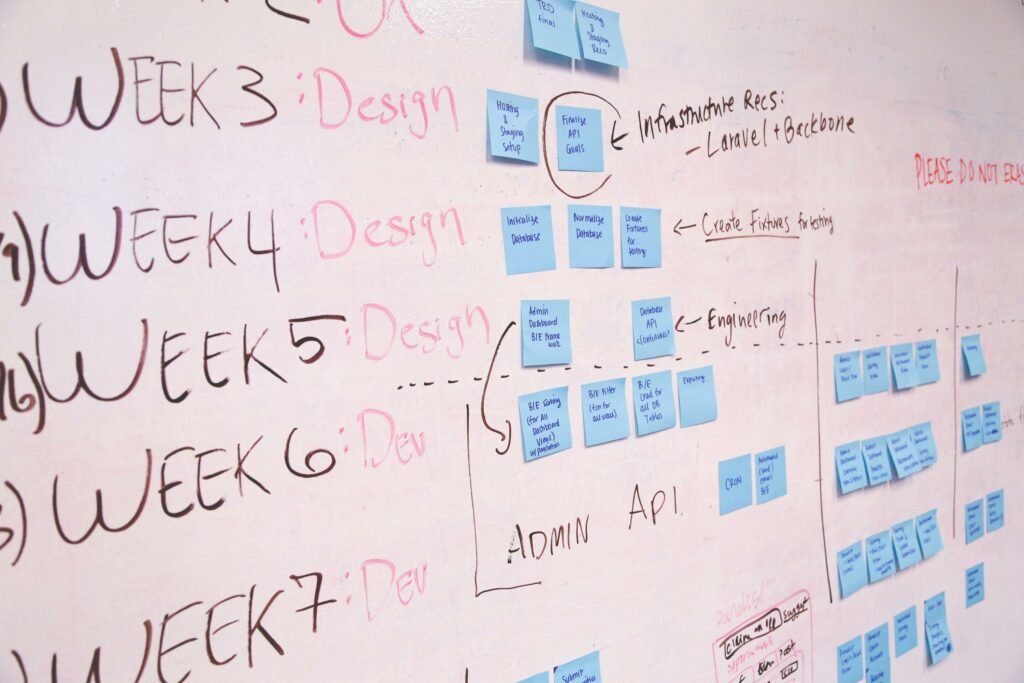Open project management strategies are revolutionizing team collaboration and driving success in every endeavor. We are witnessing the popularity of these strategies as teams harness the power of innovative approaches, advanced methodologies, and flexible solutions. By utilizing project management tools and techniques, teams can effectively plan and execute projects.
In this article, we will explore the key trends and best practices in open project management strategies that can help teams achieve their project goals.
Open Project Management Strategies Unveiled
Key Takeaways:
- Open project management strategies enhance team collaboration and drive success.
- Utilizing project management tools and techniques improves project planning and execution.
- Exploring trends and best practices can help teams achieve their project goals.
- Embracing innovative approaches leads to improved project outcomes.
- Flexibility and adaptability are key elements of open project management strategies.
The Role of Artificial Intelligence in Project Management
One of the key trends in open project management strategies is the increasing use of artificial intelligence (AI) in project management. AI-powered tools, such as Microsoft Copilot, are being developed to support project managers in their day-to-day work. These tools offer features like automatic resource leveling, updates of project plans, and AI-generated insights based on historical project data. The use of AI in project management can improve planning accuracy and reduce errors, especially for inexperienced project managers. It is important for project managers to explore and familiarize themselves with AI tools like Microsoft Copilot to make the most of their capabilities.
AI’s integration in project management brings significant benefits by leveraging advanced technologies to enhance project planning and execution processes. By utilizing AI support, project managers can:
- Automate resource leveling for optimized project plans
- Receive updates on project plans in real-time
- Gather AI-generated insights for data-driven decision-making
These AI capabilities have the potential to revolutionize project management by improving efficiency, accuracy, and overall project success.
AI-powered project management tools offer features like automatic resource leveling, updates of project plans, and AI-generated insights based on historical project data.
With AI support in project management, project managers can focus their efforts on strategic decision-making, while the AI tools handle repetitive tasks and provide valuable insights. This collaboration between human expertise and AI capabilities enhances project outcomes and drives efficiency in project delivery.
Implementing AI in Project Management
The implementation of AI in project management starts with understanding the potential applications of AI-powered tools and their integration into existing project management workflows. The following steps can guide project managers in effectively incorporating AI into their projects:
- Identify project management processes that can benefit from AI support
- Research and evaluate AI-powered project management tools
- Train project team members on utilizing AI tools and understanding their capabilities
- Start small by implementing AI in pilot projects to assess its impact
- Collect feedback and continuously improve the AI integration process
As project managers embrace AI, they position themselves at the forefront of project management innovation, equipped with powerful tools to improve project planning, forecasting, and decision-making.
A Case Study on AI Support in Project Management
| Company | Industry | Challenge | AI Solution | Outcome |
|---|---|---|---|---|
| XYZ Corporation | Technology | Limited resource allocation efficiency | Implementing Microsoft Copilot for automatic resource leveling and AI-generated insights | Resource allocation optimized, enhanced planning accuracy, and improved project delivery |
| ABC Enterprises | Manufacturing | Unreliable project forecasting | Utilizing AI-powered project management tools for accurate data analysis and forecasting | Improved project forecasting, reduced risks, and better project outcomes |
These case studies demonstrate how AI support in project management can address various challenges and deliver significant benefits across industries.
In conclusion, artificial intelligence is playing an increasingly significant role in project management. By leveraging AI-powered tools, project managers can automate repetitive tasks, optimize resource allocation, receive real-time updates, and gain valuable insights for informed decision-making. The integration of AI in project management empowers project teams to enhance efficiency, accuracy, and overall project success.
The Benefits of Project Management Tools and Automated Data Use
Project management tools play a crucial role in open project management strategies. These tools provide a wide range of features that significantly enhance project planning, collaboration, and management. By leveraging project management tools, teams can streamline their workflow, improve communication, and ultimately increase project success.
One of the primary advantages of project management tools is their cloud-based accessibility, allowing team members to access project details from anywhere, at any time. This feature enables seamless collaboration among team members, regardless of their physical location. By using cloud-based project management tools, teams can work together efficiently, leading to faster project delivery and improved productivity.
Another important feature of project management tools is their ability to facilitate cross-system integration. These tools can integrate with various business systems, such as customer relationship management (CRM) tools, enterprise resource planning (ERP) systems, and work management platforms. This integration allows for data synchronization and enables teams to have a comprehensive view of project progress and resource utilization.
Automated data use is another significant benefit of project management tools. Through automation, project management tools eliminate the need for manual data entry and compilation, reducing the risk of errors and saving valuable time. Real-time data analysis and reporting become possible, making it easier for project managers to make informed decisions and assess project performance.
Here’s an example of how automated data use can enhance project management:
Let’s say a project manager wants to track the progress of a critical task. With project management tools, the manager can view real-time updates on the task’s status, including completion percentage, resource allocation, and any potential bottlenecks. This allows the manager to take immediate action, such as reallocating resources or adjusting timelines, to keep the project on track.
To fully leverage the benefits of project management tools, project managers should explore cloud-based solutions like Microsoft Power Apps. These tools offer a comprehensive set of features designed to enhance project planning, execution, and collaboration. By incorporating project management tools into their workflows, project managers can optimize resource allocation, improve team collaboration, and drive project success.
Implementing project management tools and automated data use in project management provides teams with the tools they need to effectively plan, track, and manage their projects. The combination of cloud-based accessibility, cross-system integration, and automated data analysis empowers project managers to make informed decisions and drive project success.
Communication Integration in Project Plans
Effective communication is a crucial component of successful project management. In open project management strategies, communication is integrated directly into project plans to ensure transparency and facilitate collaboration among team members. By leveraging project communication tools like Microsoft Teams, project managers can create open communication channels that foster knowledge sharing and streamline information access.
With the integration of communication into project plans, all team members have instant access to relevant information, eliminating the need for time-consuming email threads or meetings. This seamless communication flow enhances team collaboration and promotes real-time decision-making. By leveraging project communication tools, project managers can create a culture of open communication within their teams, empowering every team member to contribute and stay informed throughout the project lifecycle.
Open communication channels in project plans also facilitate effective problem-solving and issue resolution. Team members can easily raise concerns, ask questions, and provide updates, ensuring that potential roadblocks are addressed promptly. Additionally, communication integration enables stakeholders to stay informed about project progress, leading to increased accountability and a shared understanding of project goals and objectives.
Open project management strategies prioritize effective communication as a power skill, as highlighted by the Project Management Institute (PMI). Project managers who leverage project communication tools and establish open communication channels within their teams set the stage for successful project planning and execution.
The Importance of Change Management and Transparency
Change management and transparency are vital components of successful project management. In the realm of open project management strategies, these two aspects play a crucial role in driving project success and ensuring alignment with evolving requirements.
Open communication channels and collaborative project management frameworks enable teams to effectively handle change management processes. By monitoring and managing project changes in real-time, teams can ensure that project objectives are adjusted and optimized accordingly. This agility allows for flexibility in project plans and supports the achievement of desired outcomes.
Moreover, transparency within the project environment promotes accountability and fosters trust among stakeholders. By providing clear visibility into project progress and potential issues, transparency allows for informed decision-making and proactively addressing challenges. This open approach creates an atmosphere of shared responsibility and collaboration, strengthening the overall project management process.
Project managers should prioritize change management and transparency as integral components of their project management strategies. By embracing change and promoting open channels of communication, project teams can effectively adapt to evolving circumstances and drive successful project outcomes.
| Benefits of Change Management and Transparency | Examples |
|---|---|
| Improved Decision-Making: Transparent project management fosters informed decision-making by providing real-time visibility into project progress, potential risks, and resource allocation. | An executive is able to make timely decisions regarding resource allocation based on the transparent view of each project’s progress. |
| Enhanced Stakeholder Engagement: Transparent project management practices ensure effective stakeholder involvement and engagement throughout the project lifecycle, fostering collaboration and driving project success. | The project manager regularly updates the client on the progress, risks, and changes, thus maintaining a high level of stakeholder engagement. |
| Effective Risk Management: Transparent project management facilitates proactive risk identification and mitigation, enabling project teams to address potential issues in a timely manner. | By maintaining transparency, the project team is able to identify and address potential risks before they escalate into significant problems. |
| Improved Team Collaboration: Transparent project management fosters a collaborative environment where team members can openly communicate, share knowledge, and work together towards project success. | Through regular team meetings and open communication channels, team members collaborate effectively, leveraging each other’s expertise to achieve project milestones. |
The Evolution of Resource Planning in Open Project Management
Resource planning plays a vital role in open project management strategies. As projects become more complex and require diverse skill sets, effective resource management becomes the key to success. By allocating resources efficiently, project managers can ensure that teams have the necessary skills and capacities to deliver project outcomes.
Project management tools provide valuable support for resource planning in project management. These tools offer features like automatic resource leveling and integration with ERP, CRM, and work management systems. With automatic resource leveling capabilities, project managers can optimize resource allocation and avoid overloading team members, ultimately enhancing project efficiency.
By integrating project management tools into resource planning, project managers gain access to valuable insights and analysis. These tools facilitate data-driven decision-making by providing real-time information on resource availability, utilization, and allocation. Project managers can leverage advanced planning capabilities to optimize team allocation, ensuring the right resources are assigned to the right tasks at the right time.
| Benefits of Resource Planning in Open Project Management |
|---|
| 1. Enhanced resource allocation |
| 2. Improved project efficiency |
| 3. Avoidance of resource overloading |
| 4. Real-time resource availability insights |
| 5. Data-driven decision-making |
With resource management tools, project managers can effectively track and manage resource utilization, ensuring that teams have the necessary skills and capacities to deliver successful project outcomes. By embracing resource planning and leveraging project resource management tools, teams can drive project efficiency, optimize resource allocation, and ultimately achieve their project goals.
Conclusion
Successful project management techniques and best practices in project management play a pivotal role in driving project outcomes. Open project management strategies offer teams innovative approaches and effective techniques that enhance project planning and execution processes.
By leveraging project management tools and adopting agile methodologies, we can optimize project performance and ensure efficient resource allocation. Prioritizing open communication and transparency within project teams fosters collaboration, accountability, and knowledge sharing.
Embracing change and utilizing advanced technologies is key to project success. By implementing open project management strategies and incorporating best practices, we can achieve our project goals and drive overall success in our organizations. Let us cultivate a collaborative project management culture where innovation and continuous improvement are at the forefront of our project endeavors.
FAQ
What are open project management strategies?
Open project management strategies are innovative approaches that prioritize collaboration, flexibility, and transparency in project planning and execution. These strategies utilize project management tools and techniques to effectively plan and manage projects while fostering team collaboration.
How can artificial intelligence (AI) enhance project management?
AI-powered tools, such as Microsoft Copilot, can improve project management by offering features like automatic resource leveling, updates of project plans, and AI-generated insights based on historical project data. AI in project management can improve planning accuracy, reduce errors, and support project managers in their day-to-day work.
What are the benefits of using project management tools?
Project management tools offer features like cloud-based access, streamlined collaboration, and cross-system integration. These tools make it easier for teams to plan, track, and manage projects effectively. They also enable automated data use, allowing for real-time data analysis and reporting, improving efficiency in the project environment.
How can communication be integrated into project plans?
Communication can be integrated into project plans by utilizing tools like Microsoft Teams, which facilitate communication and collaboration within project teams. By integrating communication channels directly into project plans, all team members have instant access to relevant information, ensuring transparency and knowledge sharing.
Why is change management and transparency important in project management?
Change management and transparency are crucial components of successful project management. Open communication channels and collaborative project management frameworks enable effective change management processes. Transparency promotes accountability and allows stakeholders to stay informed about project progress and potential issues.
How does resource planning contribute to successful project management?
Resource planning is vital for project success, especially with increasing project complexity and the need for diverse skill sets. Project management tools offer features like automatic resource leveling and integration with ERP, CRM, and work management systems. These tools help project managers optimize resource allocation and ensure that teams have the necessary skills and capacities to deliver project outcomes.
What are some best practices in project management?
Best practices in project management include embracing change, utilizing advanced technologies like AI, cultivating a collaborative project management culture, and prioritizing open communication and transparency. By implementing these practices, teams can enhance their project planning and execution processes and achieve their project goals.










